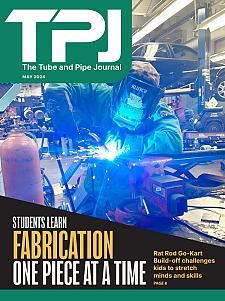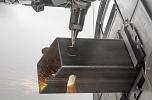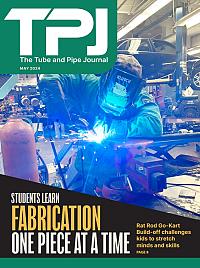- FMA
- The Fabricator
- FABTECH
- Canadian Metalworking
Categories
- Additive Manufacturing
- Aluminum Welding
- Arc Welding
- Assembly and Joining
- Automation and Robotics
- Bending and Forming
- Consumables
- Cutting and Weld Prep
- Electric Vehicles
- En Español
- Finishing
- Hydroforming
- Laser Cutting
- Laser Welding
- Machining
- Manufacturing Software
- Materials Handling
- Metals/Materials
- Oxyfuel Cutting
- Plasma Cutting
- Power Tools
- Punching and Other Holemaking
- Roll Forming
- Safety
- Sawing
- Shearing
- Shop Management
- Testing and Measuring
- Tube and Pipe Fabrication
- Tube and Pipe Production
- Waterjet Cutting
Industry Directory
Webcasts
Podcasts
FAB 40
Advertise
Subscribe
Account Login
Search
Making the most of a "retro" career in manufacturing, fabricating
Enhancing a modern career with a throwback strategy of industry association participation
- By Eric Lundin
- May 22, 2020

Longevity with a single employer wasn’t the only ingredient in many manufacturing careers from decades ago. In an earlier era, membership in industry associations and volunteering to work on industry-related technical councils and committees were considered necessary to have a full-fledged professional career. Getty Images
Use the word retro in the right context and it’s sure to conjure up an image of something timelessly cool, such as a car, a guitar, a radio, or anything with a vintage look. Whether the style is something definite, like art deco, or something with fins or at least inspired by a fin concept—a 1959 Cadillac Eldorado; a 1963 Gibson Firebird guitar; or a 1937 Sparton radio, model 557—many products that once were commonplace are now rare and sought after. Even many everyday items can make an impression. In the 2015 movie the Intern, Robert De Niro plays a 70-year-old widower who decides to get back into the workforce, and his classic leather briefcase is the envy of a twentysomething coworker.
Would anyone say that a career could be retro? Well, probably not, but indeed a conventional modern career is substantially different from a career from a generation or two ago. In days gone by, it was common to spend an entire career working for just one or maybe two employers. These days, it’s not uncommon for a professional to work for several employers and work in a couple of different industries throughout the span of a career.
Another factor that sets the generations apart is the amount of participation in industry associations. In past eras, it was customary for professionals to join associations, attend conferences on a regular basis, and maybe contribute with a presentation from time to time. Meeting with competitors face-to-face can be a bit dicey, but opportunities to rub elbows with peers to keep up with the latest in industry trends can be invaluable.
This came up regarding one recent Tube & Pipe Journal article, “Using welding codes to develop robust welding procedures.” Although many people probably think that welding codes are generated by industry associations such as the American Welding Society (AWS), that’s not true. AWS organizes the technology committees and solicits participation, but the folks who do the heavy lifting come from the industry. Whether they are engineers, metallurgists, welding specialists, or have some other relevant experience, they aren’t AWS employees but people who work in industry every day.
One of the contributors to the article, Walter Sperko, a metallurgist by education and a welding engineer by experience, discussed with me some of the many benefits of participating on such a committee or council. The main thing is that the people who develop the codes know them more thoroughly than anyone else, so they can do more than merely attempt to meet them. In Sperko’s words, “They know what’s going on, they know what’s coming, and they know why.” Because the committees are made up of not only manufacturers of products, but also users of those products and other technical experts, discussions among committee members provide all sorts of insights regarding trends in relevant technologies, thorough understandings of the challenges and difficulties the industries are facing, and the directions in which their industries are heading.
This can lead to all sorts of benefits to a committee member and his employer—far too many to mention here—but consider two. First, if a dispute over interpretation of a code arises between shop supervisors and shop quality control inspectors or a customer’s quality control inspectors or anyone else, a committee member is much more likely to provide an accurate perspective and suggest the proper resolution than anyone else. Second, because the committees meet on a regular basis, committee members have a good idea about what’s coming next. They can get ahead and stay ahead of regulators, auditors, and competitors.
Right now, in the midst of an outbreak of a virus that has many of us wondering just what will happen next, nobody would expect an upsurge in industry participation. These days we’re all preoccupied with everything else regarding how our companies and our industry will weather this storm—sales, revenue, company travel policy, airline flight cancellations—but that said, this is probably as good a time as any to give a little thought to joining an association and inquiring about participation in a technical committee or council. The main criteria are relevant experience and an interest in making a contribution.
A classic leather briefcase is optional.
subscribe now

The Tube and Pipe Journal became the first magazine dedicated to serving the metal tube and pipe industry in 1990. Today, it remains the only North American publication devoted to this industry, and it has become the most trusted source of information for tube and pipe professionals.
start your free subscriptionAbout the Author

Eric Lundin
2135 Point Blvd
Elgin, IL 60123
815-227-8262
Eric Lundin worked on The Tube & Pipe Journal from 2000 to 2022.
About the Publication
Related Companies
- Stay connected from anywhere

Easily access valuable industry resources now with full access to the digital edition of The Fabricator.

Easily access valuable industry resources now with full access to the digital edition of The Welder.

Easily access valuable industry resources now with full access to the digital edition of The Tube and Pipe Journal.
- Podcasting
- Podcast:
- The Fabricator Podcast
- Published:
- 04/16/2024
- Running Time:
- 63:29
In this episode of The Fabricator Podcast, Caleb Chamberlain, co-founder and CEO of OSH Cut, discusses his company’s...
- Trending Articles
Zekelman Industries to invest $120 million in Arkansas expansion

3D laser tube cutting system available in 3, 4, or 5 kW

Corrosion-inhibiting coating can be peeled off after use

Brushless copper tubing cutter adjusts to ODs up to 2-1/8 in.

HGG Profiling Equipment names area sales manager

- Industry Events
16th Annual Safety Conference
- April 30 - May 1, 2024
- Elgin,
Pipe and Tube Conference
- May 21 - 22, 2024
- Omaha, NE
World-Class Roll Forming Workshop
- June 5 - 6, 2024
- Louisville, KY
Advanced Laser Application Workshop
- June 25 - 27, 2024
- Novi, MI


























